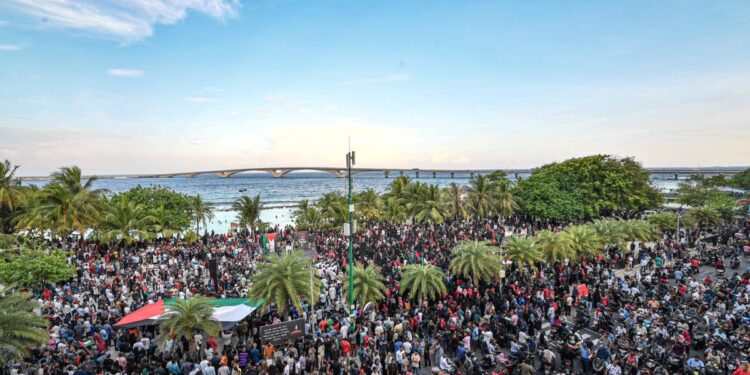The Maldives has announced a ban on Israeli passport holders as a show of solidarity with the besieged people of Gaza facing relentless attacks and mass hunger. President Mohamed Muizzu’s office issued a statement confirming the decision, which comes as public anger rises in the predominantly Muslim nation over the ongoing war in Gaza. The statement did not specify when the new law would take effect. President Muizzu also unveiled a national fundraising campaign called “Maldivians in Solidarity with Palestine.” This move aligns with the growing pressure from opposition parties and government allies in the Maldives who have been advocating for a ban on Israelis to protest the Gaza conflict. Official data reveals that nearly 11,000 Israelis visited the Maldives last year, accounting for 0.6 percent of total tourist arrivals. However, the number of Israeli visitors dropped to 528 in the first four months of this year, an 88 percent decrease compared to the same period last year.
The Maldives had previously lifted a ban on Israeli tourists in the early 1990s and moved to restore relations in 2010. These normalization attempts, however, were disrupted following the ousting of President Mohamed Nasheed in February 2012. The latest decision to impose a ban on Israeli passport holders marks a significant policy reversal. The ban on Israeli passport holders reflects a broader trend in Muslim-majority countries expressing opposition to Israeli policies in Gaza. Israeli citizens are also barred from entering Algeria, Bangladesh, Brunei, Iran, Iraq, Kuwait, Lebanon, Libya, Pakistan, Saudi Arabia, Syria, and Yemen. The Maldives’ decision is part of this broader geopolitical stance.
An Israeli foreign ministry spokesman responded to the Maldives’ announcement by advising Israeli citizens currently in the Maldives to consider leaving the country. “For Israeli citizens staying in the country, it is recommended to consider leaving, since if they fall into distress for any reason, it will be difficult for us to help,” the spokesman said.
The war in Gaza, which began on October 7, has led to significant casualties and destruction. According to reports, at least 36,439 Palestinians have been killed and 82,627 wounded in the conflict. The situation has drawn widespread international condemnation and has led to various forms of protest and solidarity actions around the world. The Maldives’ decision to ban Israeli passport holders and launch a national fundraising campaign underscores the island nation’s commitment to supporting the Palestinian cause. This move is likely to resonate with the Maldivian public, which has shown increasing concern over the situation in Gaza.
In March, the State of Israel posted a message on social media platform X, responding to a post about countries with entry bans on Israeli passport holders. The post stated, “We’re good,” acknowledging the longstanding restrictions in place even before the current Gaza conflict.
The Maldives’ decision adds to the growing list of countries taking a stand against Israel’s actions in Gaza. As the conflict continues, it is expected that more nations may adopt similar measures to express their disapproval and support for the Palestinian people.
The impact of the Maldives’ ban on its tourism industry remains to be seen. While Israeli tourists represent a small fraction of the overall tourist arrivals, the ban could signal a broader shift in the Maldives’ foreign policy and its stance on international human rights issues. The country’s leadership appears willing to prioritize its political and humanitarian principles over potential economic considerations. The Maldives’ move also highlights the challenges faced by Israeli travelers in navigating geopolitical tensions. With an increasing number of countries restricting entry to Israeli passport holders, Israeli citizens may find their travel options limited, particularly in regions where there is strong support for the Palestinian cause. In conclusion, the Maldives’ decision to ban Israeli passport holders and launch a national solidarity campaign for Palestine is a significant political statement amid the ongoing Gaza conflict. This move reflects the rising public anger in the Maldives and aligns with broader international condemnation of the situation in Gaza. As the conflict persists, the Maldives’ actions may inspire similar measures from other nations, further isolating Israel diplomatically and emphasizing the global demand for justice and human rights.
















